Actor Emile Hirsch Lost Six-Figures in High-Stakes Game Preparing for ‘Dead Money’
Dead Money, the new poker movie written by Josh Wilcox and directed by Luc Walpoth, is out now, and someone who is especially excited about it is the star of the film, Emile Hirsch, who you may know from hits such as Into the Wild, Speed Racer, and The Autopsy of Jane Doe.
Hirsch plays Andy, who along with his girlfriend Chloe, played by India Eisley, “are involved in a crazy 24 hours after a home poker game is robbed. Andy finds up playing the largest poker game of his life as both of their lives are in danger.”
The film, which was originally titled Degenerate, costars David Keith, Jack Earle Haley, Rory Culkin, and Peter Facinelli, and has received some positive reviews from critics.
“They’re all talented. They can almost do it with their eyes closed in a way, you know, but they still come and show up and they’re really going for it,” Hirsch said of his castmates. “India Isley and Peter Facinelli are both fantastic. One of the strengths of the film is really the cast, and the specificity of all the performances that Luc Walpoth, the director, gets out of everyone.”
PokerNews recently spoke with Hirsch about his new film and the research that went into it.
Studying for the Role
Hirsch became attached to the project after previously working with the producers on a film called Walden.
“I had a lot of fun making that film. They reached out to me and sent me the script that Josh Wilcox had written. Josh used to be a poker regular at Hustler Casino, that was what he did for a living. He was a real grinder. So, the screenplay had a kind of authenticity to it, which I found kind of cool.”
However, to star in a poker-related movie Hirsch, who prior was simply a recreational player, knew that he’d have to up his game.
“I’d play every couple of years and then I would just savagely lose, just quit, and then not play for a few years. That was sort of my kind of Groundhog Day routine that I would do. But when I got sent the script, I was excited because it was a chance for me to kind of get back into playing and maybe I’ll learn how to play better and win.”
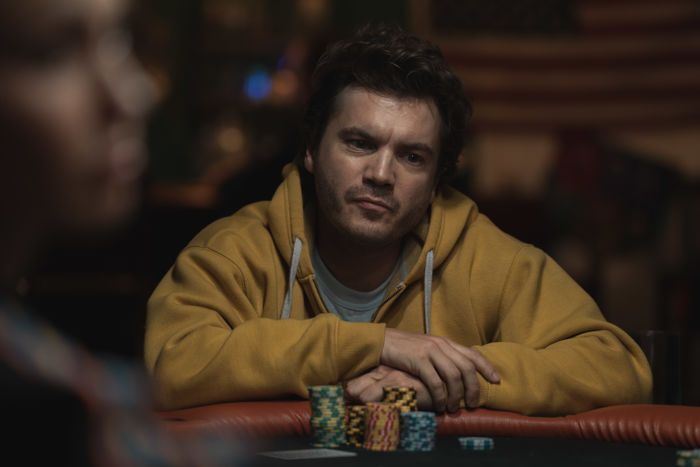
Losing Six Figures
The producers of the movie wanted Hirsch to experience a high-stakes game prior to shooting so they arranged for him to participate in a game run by Alan Keating.
“We actually played for two nights and the first night I lost over six figures,” explained Hirsch, who said he also watched Daniel Negreanu and Phil Ivey’s MasterClass courses. “You have to remember before that the most I’d ever lost gambling was like $1,000, and I would go home and be sick to my stomach.”
“I came all the way back from all the money that I’d been down and I basically got even and walked away. I felt like Rocky at the end of the movie. It was just crazy.”
He continued: “I talked my way into going the second. I’m thinking, if I lose again, like, if I lose another six figures, this is the worst thing ever. I went back and I lost half my stack. I just felt like I wasn’t getting a hand, I wasn’t getting anything, and I just kind of shut down. I just went into pure survival mode and I just folded for hours. I was the most patient dude ever, and then all of a sudden, within an hour I hit a heater. I came all the way back from all the money that I’d been down and I basically got even and walked away. I felt like Rocky at the end of the movie. It was just crazy.”
He then joked, “I told the producer after, ‘I think they were pretty pissed when I left.’ And he goes, ‘Good, if they’re happy, that’s not good for you.’ That was honestly a completely crazy experience for me.
Playing in the WSOP Main Event
Even after filming completed, Hirsch found himself continuing to live the lifestyle occasionally playing $5-$5 at either Hustler Casino, Hollywood Park, or The Commerce. Additionally, he flew under the radar and even played in the 2023 World Series of Poker (WSOP) Main Event.
“I did so badly,” he lamented. “The guy literally turned straight and I had aces. I just fell in love with them and just classic donkey behavior. I was so sad. I don’t know if anyone recognized me, but if they did they didn’t say anything.”
Painting for the Pros
During his preparation, Hirsch spent time alongside noted poker players Alan Keating, Nik Airball, and Ryan Feldman (a recent guest on the Life Outside Poker Podcast). Not only did he make some new friends, but he also found an opportunity to use his talent to tap into the high-stakes scene.
“I started doing paintings a few months ago and I would paint these players and stuff. So, these players, these really high-stakes guys, were hitting me up to do portraits. So, I was like, heck yeah, that’s awesome, an awesome use of my time. I was like, I’ll paint to get a bankroll to play, you know what I mean? I won’t get all bummed thinking I’m tapping into my son’s college tuition or something to play some crazy game.”
Hirsch went on to present several players with their own painted portraits.
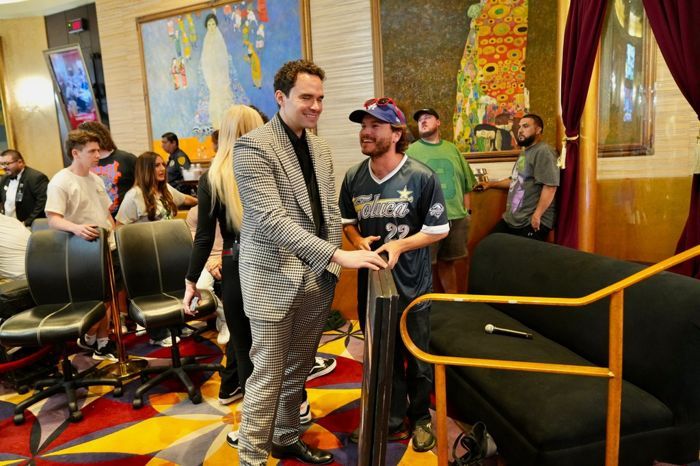
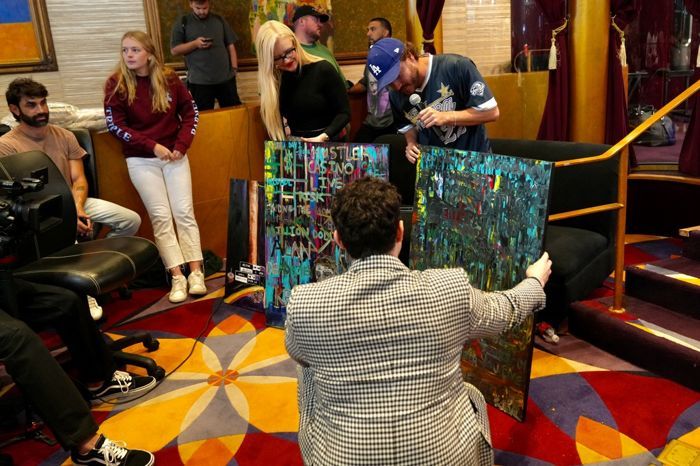
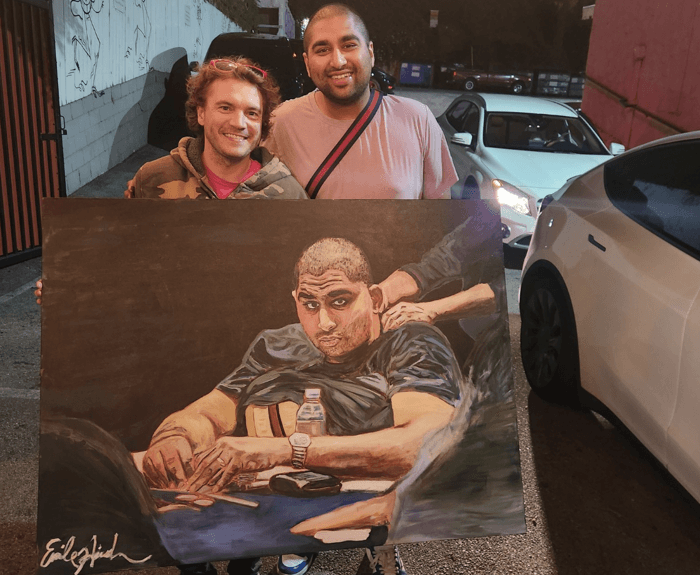 “I think poker is a game that visually paints well, you know what I mean?” said Hirsch. “It’s fun. You see the chips, it’s just the vibe, the attitude, you know, it’s cool.”
“I think poker is a game that visually paints well, you know what I mean?” said Hirsch. “It’s fun. You see the chips, it’s just the vibe, the attitude, you know, it’s cool.”
What’s Next?
With the movie now, what’s next for Hirsch? Will he continue to linger in the poker community?
“I’ll be around it to a certain extent just because I know all these guys now and I’m doing these paintings in my spare time, and so in a way I will,” he shared. “I still watch HCL all the time, I’ll watch the The Lodge, I’ll watch Mariano and Rampage, their vlogs, and Brad Owen and Lexo. I watch a lot of different YouTube videos, like kind of a lot. Even if it’s not your money I still like watching all the videos and all the hands and it’s just really interesting. I do think that poker does strengthen a lot of life skills, you can work on a lot of sides of yourself.”
Statement from Director Luc Walpoth
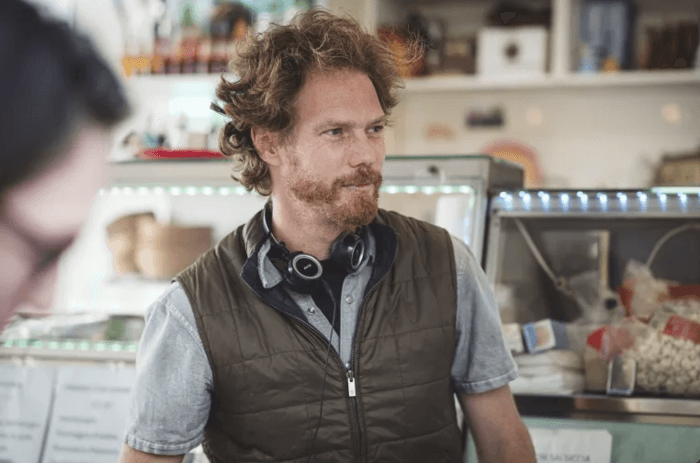 The studio was kind enough to share a statement from the film’s director, Luc Walpoth, who talked about what attracted him to the project, his research, and the cast.
The studio was kind enough to share a statement from the film’s director, Luc Walpoth, who talked about what attracted him to the project, his research, and the cast.
We’ve all seen a lot of poker movies but a select few stand out as classics. The majority of these films tend to perpetuate the myth of the brilliant underdog who prevails through sheer tenacity, strategy, and cunning.
When I started digging into the research on DEAD MONEY the reality of life couldn’t be more different and the world of underground poker, as fascinating as it may seem to the outsider, seldom resembles the glamorous portrayals found in cinematic classics. Most players are driven by greed and adrenaline and are pretty much the definition of degenerate.
When I first read DEAD MONEY what triggered my interest was the tone. It was crazy fusion of a gripping violence and uniquely humorous characters. As I delved deeper into the screenplay, I came to the realization that barring the dealer, Kelly, none of the characters could claim any moral superiority over the others; they were all, in essence, the true definition degenerates. But what an incredible ensemble of captivating degenerates they turned out to be.
During the prep, I was blown away that many of the poker stories, the audacious bets, the artful cheating, and the degenerate essence of the characters portrayed in our film were rooted in the real-life experiences of the writer, a former poker player.
My goal for the film was to maintain a dark, and violent tone while allowing each character the freedom to transcend the boundaries of larger-than-life personas, all within the context of the cinematic world I was creating. Achieving this delicate balance posed a challenge, as each character seemed determined to inhabit their own universe.
Casting of this movie was an absolute delight. The script and its subject matter attracted a multitude of talented actors, and I couldn’t be more thrilled with the cast I had the privilege of directing. Each actor drew from their personal experiences to breathe life into their characters, and their collaborative spirit on set contributed to a seamlessly cohesive ensemble. It was one of the best creative experiences I’ve ever had.
Visually, my cinematographer and I worked to ground the story in reality rather than succumbing to hyper-stylization. My editor played a pivotal role in striking the precarious balance between moments of comedy and violence. The sound and music were meticulously designed to guide the audience through a dark comedic labyrinth of greed and love.
Navigating the fine line of maintaining the tension of a thrilling dark comedy and ensuring a fun experience for the audience was my main goal. I hope you’ll enjoy watching the movie as much as we enjoyed making it.
PR & Media Manager for PokerNews, Podcast host & 2013 WSOP Bracelet Winner.
FAQ
How much are the Money Fishes worth Big Bass Bonanza?
How much are the Money Fishes worth Big Bass Bonanza? The values range from 2x your bet to 50x your bet, depending on the size of the fish.
Does Sweet Bonanza pay real money?
Does Sweet Bonanza pay real money? About Sweet Bonanza Bananas, Grapes, Watermelons, and Apples, will give you that taste of sweetness, as well as being part of your five a day. Cluster up to 12 of these delicious symbols to win tasty real cash prizes.
How do you become a WPT player?
How do you become a WPT player? Players can qualify for the WPT at the local casino where the event is held. In addition, online poker operators including partypoker offer satellites to many WPT events. Players can also qualify for free via the Club WPT app and will be able to qualify in the future at WPT Global.
What are the different types of WPT?
What are the different types of WPT? Table 1 WPT Technology Frequency Capacitive CPT Laser LPT Radio frequency RFPT Acoustic APT
Who is the best WPT player?
Who is the best WPT player? Leaderboard Rank Player Titles 1 Carlos Mortensen 3 2 Daniel Negreanu 2 3 Michael Mizrachi 2 4 Fedor Holz 1
Download & Play WPT Global Application In Shortly
This site only collects related articles. Viewing the original, please copy and open the following link:Actor Emile Hirsch Lost Six-Figures in High-Stakes Game Preparing for ‘Dead Money’
















